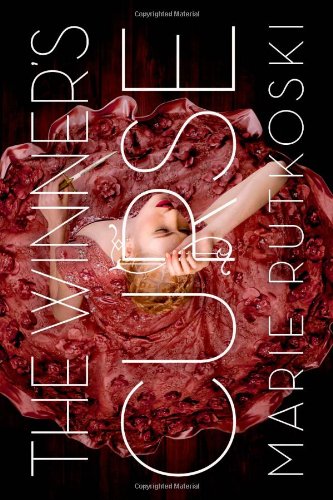All Nonfiction
- Bullying
- Books
- Academic
- Author Interviews
- Celebrity interviews
- College Articles
- College Essays
- Educator of the Year
- Heroes
- Interviews
- Memoir
- Personal Experience
- Sports
- Travel & Culture
All Opinions
- Bullying
- Current Events / Politics
- Discrimination
- Drugs / Alcohol / Smoking
- Entertainment / Celebrities
- Environment
- Love / Relationships
- Movies / Music / TV
- Pop Culture / Trends
- School / College
- Social Issues / Civics
- Spirituality / Religion
- Sports / Hobbies
All Hot Topics
- Bullying
- Community Service
- Environment
- Health
- Letters to the Editor
- Pride & Prejudice
- What Matters
- Back
Summer Guide
- Program Links
- Program Reviews
- Back
College Guide
- College Links
- College Reviews
- College Essays
- College Articles
- Back
The Winner's Curse by Marie Rutkoski
In the aristocratic society where Kestrel resides, superiority is a universal attribute and war is the national obsession. Someone once tells her that “A kestrel is a hunting hawk,” to which she agrees unconvincingly, “Yes. The perfect name for a warrior girl.”
Being the only child of the highly respected Head General, Kestrel is required to enlist for the army before her twentieth birthday, when citizens of Valoria must decide to marry, or they will be drafted into the military. Kestrel has a knack for battle strategization, and her father wishes to work with her, despite the fact that if she enlists, she’ll have to give up playing the piano, which is viewed upon as a slave’s task. But is she really willing to sacrifice her one true passion—music—in order to please her father?
When she purchases a slave sold as a singer at a local auction, society begins to speak. They had anticipated that she would be in the army already, not being caught sneaking to and from the music room, in re a disinterested low class citizen.
Consequently, Kestrel and her father strike a deal: by spring, she will be married, or her father will get his way and she will enlist; both forms of life-long commitment to which she is directly opposed. However, she decides that this agreement is better than the alternative scenario, and inevitably succumbs to his blackmail and manipulative word choice.
Even though the most frequently used idiomic cliché remains to be “Don’t judge a book by its cover,” admittedly, we all do. [It has been scientifically proven that “within a tenth of a second of seeing a person for the first time, we have already made a series of judgments, not just about attractive they are, but how trustworthy they are, how assertive they are, how funny they're going to be. We're built to make these snap judgments about each other because at some point in our history, it was necessary for our survival to do so. And now, we build even more signals into the way we style our hair, the shoes that we wear, the socks, the clothes, tattoos and piercings, all a way to give cultural cues about what kind of person we are.” (Hank Green)].
We are all awash in this excessively unrectified and yet widely popular subconscious appeal to the visually representative. We make all these initial and usually incorrect assumptions that are based solely on superficiality and appearance; and we do this—we judge others—so quickly; so habitually; so instictually; and so often that we’re not even aware that we are doing it half the time.
I was discussing this disappointing fault of our underling human lives (Julius Caesar reference) with one of my closest friends not too long ago (a bit ironic, as we live in Orange County). He laughed and then said to me: “It is not a question of whether we are superficial; it is a question of to what extent. Myself, of course, being of no exception to this philosophy.” This is something, I think, that was conveyed as a theme throughout The Winner’s Curse, as it was definitely something that I took away from it.
I, subsequent to my superficial examination, expected The Winner’s Curse to be an anticipatable, contemporized attempt to reconjure the simultaneous romance and tragedy of a Shakespearean drama lo the many, many authors that have tried—and failed—to do just that. In a nutshell, this book is not a poor attempt to recreate the irreplaceable story of Romeo and Juliet like the cover so obviously suggests.
The Winner’s Curse contains love and violence; separation and companionship; countless lies and recoverable truths; manipulation and forgiveness. It addresses the differentiation between what is expected of us—or what people want for us—and what we, for ourselves and what we love, aspire to become. It is that passion; that thing that we do solely because we love doing it, despite what society tells us we should be doing instead, that shapes us into the individual that we will grow to be.
This is an exceptional book and I recommend it to fans of The Hunger Games trilogy, the Divergent trilogy, The Giver series, the Matched trilogy, and the Delirium trilogy. Needless to say, it is the first book in a trilogy as well.
Similar Articles
JOIN THE DISCUSSION
This article has 0 comments.

